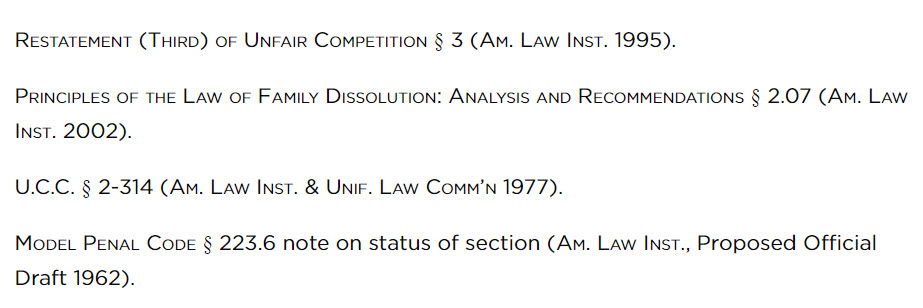The below post originally appeared in the Fall 2015 Edition of The ALI Reporter.
Linking these two iconic institutions in American law might seem strange at first glance. As we all know, the ALI is the most prominent law reform organization in the United States. Its charter states that it was established “to promote the clarification and simplification of the law.” The Bluebook: A Uniform System of Citation is the bane of every law review editor’s existence and the most important force in promoting consistency in legal citations. The ALI focuses on substance; The Bluebook on form. So, what possible relevance could the recent publication of the 20th edition of The Bluebook have for the ALI?
Through its 19th edition, The Bluebook provided that Restatements of the Law and Model Codes should be cited by their title, followed by their year of publication. The relevant rule indicated that the name of the author should be indicated parenthetically, unless the work was authored by the American Bar Association; the American Law Institute; the National Conference of Commissioners on Uniform State Laws, also known as the Uniform Law Commission (ULC); or a sentencing commission. The apparent rationale was that readers would generally know which works were produced by the ALI (and by the other organizations singled out in The Bluebook’s rule).
But how many lawyers can correctly identify the institutional authors of all three of these works: Restatements of the Law, the Model Penal Code, and the Uniform Commercial Code? In case you are hesitating, the correct answers are, respectively, the ALI, the ALI, and the ALI jointly with the ULC. My nonscientific survey of law students indicated that many of them cannot answer this question correctly. And my intuition was that neither can many experienced lawyers.
A quick check of reputable websites confirmed my intuition. For example, a prominent law school website indicates that the purpose of the National Conference of Commissioners on Uniform State Laws “is to discuss and debate which areas of the law require uniformity among the states and territories” and that “[t]he results of these discussions are proposed to the various jurisdictions as either model acts (such as the Model Penal Code) or uniform acts (such as the Uniform Commercial Code). The website of another prominent law school acknowledges that we are responsible for the Model Penal Code but denies us any credit for the UCC.
Our Principles of the Law were not covered by any Bluebook rule and were often cited inconsistently, sometimes indicating that the ALI was the institutional author but other times leaving out this information. Since the publication of Principles of Corporate Governance in 1994, Principles projects have become an important component of the ALI’s work. But they lack the longstanding lineage of Restatements and are thus even less likely to be widely associated with the ALI in the absence of an explicit mention in the citation.
The confusion that I describe above impairs the value of our brand and the influence of our work. As a result of the quality of our publications, the ALI has earned a uniquely influential role in American law. But, to the extent that the ALI’s connection to particular projects is not widely acknowledged, the influence of these works is likely to be somewhat diminished.
To correct this problem, and with the collaboration of ALI Council member (and Harvard law professor) Robert Sitkoff, I met with the leadership of The Bluebook revisions, just as the 20th edition was close to completion. The result is that we are now explicitly acknowledged as the institutional author of our works. I am very grateful to The Bluebook’s editors for their willingness to engage in a dialogue on these issues.
So, what better way to start taking advantage of the new edition of The Bluebook than by having the ALI’s members follow its new rule for citing our work? To save you the trouble of having to flip through 560 pages, here are the relevant examples (from pages 131 and 132), which will guide you on the citations of the vast bulk of the ALI’s work:

As law review editors begin to use The Bluebook’s 20th edition, the confusion about the ALI’s role with respect to some of our nation’s most important legal texts will begin to fade. Let’s be among the first to usher in the changes.

0 Comments